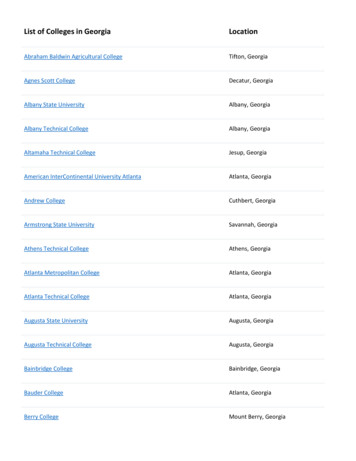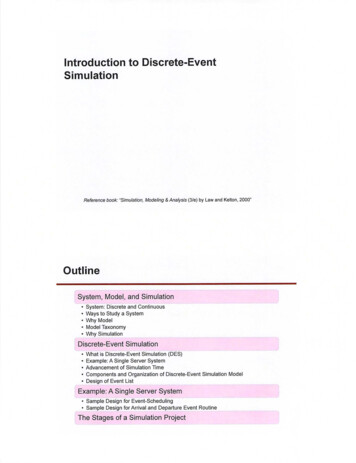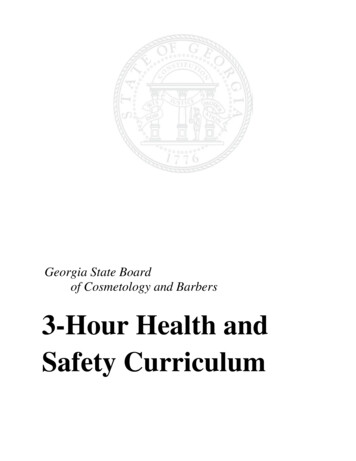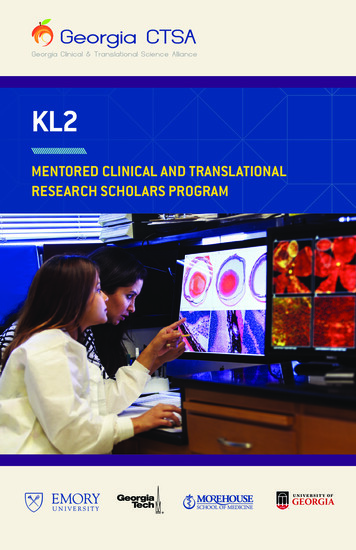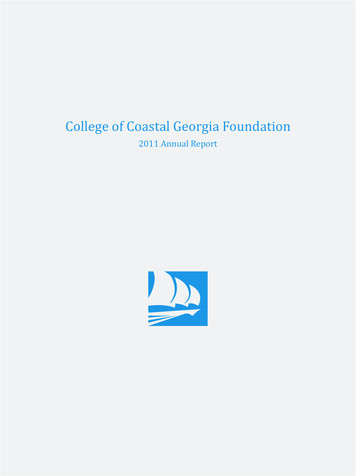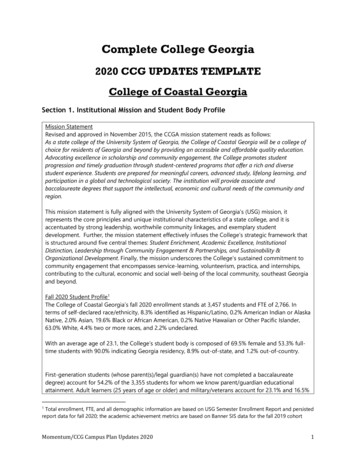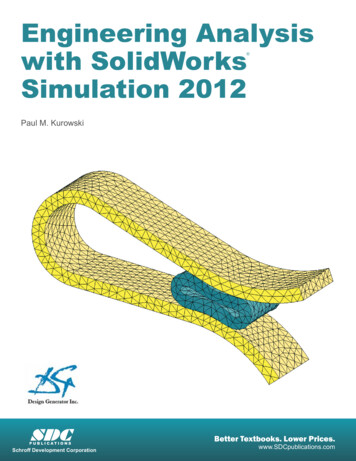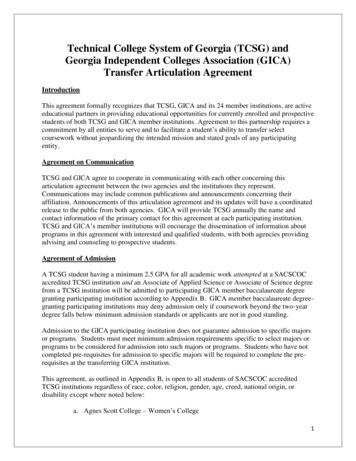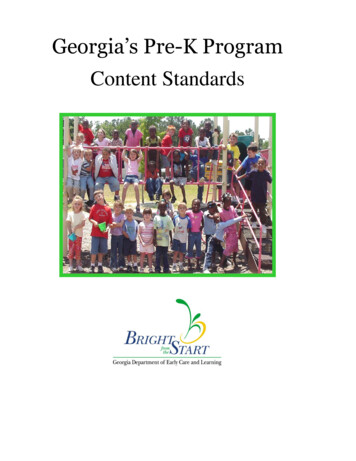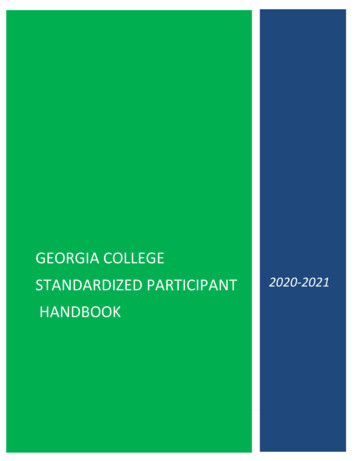
Transcription
Georgia CollegeSimulation and Translational Research CenterGEORGIA COLLEGESTANDARDIZED PARTICIPANT2020-2021HANDBOOKCreated by Dr. Sterling Roberts and Ms. Paige Ivey, NFO approved 08/20201 Page
Georgia CollegeSimulation and Translational Research CenterTable of ContentsNameI. General InformationWelcomeHours of OperationEqual Opportunity EmployerHarassment PolicyApplication Process for Adult Standardized ParticipantsRequired PaperworkII. Working as a Standardized Participants at Georgia CollegePayments and BenefitsScheduling of Standardized Participant EventsTypes of Standardized Participant EventsInterview EventPhysical Assessment EventSensitive ExaminationsPunctualityConfidentialityParkingMeals and BreaksAssigned RoleHybrid SimulationsUse of Video EquipmentTrainingThe Script and ChecklistRole EtiquetteDress CodeCell PhonesFeedbackSP Performance ReviewChecklists and STRC ComputersDetection of Findings in Standardized ParticipantsInjuries/AccidentsSP Termination of Student EncounterIII. Procedures to Stop a SessionStandardized ParticipantsSTRC FacultyCreated by Dr. Sterling Roberts and Ms. Paige Ivey, NFO approved 112 Page
Georgia CollegeSimulation and Translational Research CenterSP CoordinatorSimulation Specialist or other STRC FacultyIV. Other InformationCancellation of EventLast Minute Call ListCall-In ProcedureCreated by Dr. Sterling Roberts and Ms. Paige Ivey, NFO approved 08/20201112121212123 Page
Georgia CollegeSimulation and Translational Research CenterIntroductionWelcome to the Standardized Participant Program at Georgia College (GC). As a component of theSimulation and Translational Research Center (STRC) our Standardized Participant (SP) Program offersstudents an array of educational experiences to support numerous opportunities to develop andpractice essential clinical skills and safe patient care, such as communication and physical assessment,within a secure learning environment. We employ individuals to portray the role of patients withdifferent conditions and emotional states in various patient care settings.The GC SP Program currently serves students in the School of Nursing. Interprofessional educationexperiences are conducted with other healthcare disciplines within the GC College of Health Science.The following information outlines the expectations we have for employees of the StandardizedParticipant Program as well as the policies and procedures essential to accomplish the mission of theSTRC. Additional information about the STRC can be obtained on our website at GC Simulation andTranslational Research CenterSTRC Hours of operation:Monday – Friday 8:00 a.m. – 5:00 p.m.If you have any questions please contact one of the following staff members:Gail Godwin, PhD, PMHNP-BC, CNE, SP Coordinator478-445-3928Paige Ivey, MSN, RN Simulation Specialist478-445-8564Sterling Roberts, DNP, RN, CHSE STRC Director478-445-5129Equal Opportunity EmployerGeorgia College (GC) is committed to the fundamental principle of equal employment opportunity andequal treatment for every prospective and current employee and strives to create a campusenvironment, which understands, fosters, and embraces the value of diversity. No person shall, on thegrounds of race, genetic information, color, sex, sexual orientation, religion, national origin, age,disability, veteran status be excluded from employment or participation in, be denied the benefits of,or otherwise be subjected to discrimination, under any program or activity conducted by GeorgiaCollege.Georgia College is committed to the fundamental principle of diversity and inclusion, equal opportunityand equal treatment for all and strives to create a campus environment, which understands, fosters,and embraces the values of diversity and inclusion.Please see the following link for further information GC Equal Opportunity EmploymentCreated by Dr. Sterling Roberts and Paige Ivey, NFO approved 08/20204 Page
Georgia CollegeSimulation and Translational Research CenterHarassment PolicyGeorgia College will not tolerate harassment of any individual because of that person's sex, race,religion, color, age, national origin, veteran status, disability, or any other status protected underapplicable federal, state and local laws. Such harassing behavior should be avoided because conductappearing to be welcomed or tolerated by one employee or student may be offensive to anotheremployee or student. Respect for the dignity and worth of others should be the guiding principle forour relations with each other.Please see the following link for further information GC Harassment PolicyThe Application Process: Adult Standardized ParticipantsTo apply for a standardized participant position, please contact Gail Godwin, Standardized ParticipantCoordinator. You will be provided with directions on how to apply through the GC application website.Once your application materials have been processed through the GC Human Resources (HR)department, the Standardized Participant Coordinator will contact you to set up an interview.Additional Required PaperworkAs employees of Georgia College, standardized participants are required to complete all HR requiredpaperwork prior to working as a standardized participant. In addition, all standardized participantsmust sign the Participant Agreement, (Appendix A), and a SP Profile (Appendix B) forms. TheParticipant Agreement form prohibits SPs from discussing cases and student performance with anyoneoutside of the educational experience and gives the university the right to video and recordstandardized participant events for educational purposes. The SP Profile form is a basic medicalprofile/history questionnaire. All forms are kept in the employees file at the GC SON AdministrationOffice.Working as a Standardized Participant at Georgia CollegePayments and BenefitsStandardized participants are classified as temporary employees of the university. SPs are paid by thehour. The university pays Standardized Participants for training sessions worked at the STRC. SPs willneed to enroll in direct deposit to receive payment from the university. SP payments are dispersed biweekly. Any questions regarding pay periods and payment should be directed to GC payroll atpayroll@gcsu.eduRecords of SP worked hours is maintained by SP Coordinator. Any questions regarding compensation ishandled by the SP Coordinator and for specific payroll related questions refer to GC HR department.Scheduling of Standardized Participant EventsStandardized participant events are requested by faculty members prior to each semester (fall, spring,summer). These requests include details with specific demographics (age, gender) and other needs toprovide students with the desired learning experience and support the realism of the case. Many ofthese events require SPs with the physical ability and balance to repeatedly perform tasks and tests inorder to meet the learning objectives of the event. The SP Coordinator will work with SPs directly toCreated by Dr. Sterling Roberts and Paige Ivey, NFO approved 08/20205 Page
Georgia CollegeSimulation and Translational Research Centercoordinate scheduling for events. Case training sessions will be scheduled prior to the date of thelearning experience.Types of Standardized Participant EventsEvery standardized participant learning experience is unique and designed to meet the learningobjectives of different student groups. SP learning experiences or events are classified in severaldifferent categories, as defined below:Interview Event - These SP events are used to provide students with an opportunity to develop andpractice therapeutic techniques and communication skills. These events may involve the studentstaking a health history, practicing motivational interviewing, or therapeutic communication techniques.The SPs are provided with and expected to memorize information related to the patient they will beportraying in the ‘case’. Standardized participants are never required to share any private informationthat they do not wish to share.Physical Assessment Event - During these events students will practice the skills of physical assessmentwith or sometimes without taking a medical history. Students may practice a complete physicalexamination that includes such elements as looking into the eyes, ears, throat and nose, taking bloodpressure, and checking reflexes. A more focused exam may assess just a few elements of a physicalassessment (such as the heart, lungs, and stomach). To support the validity of a patient ‘case’ the SPmay be asked to wear a special pre-programmed shirt that will allow the students to hear theabnormal heart/lung/abdominal sounds. The SPs are provided with and expected to memorizeinformation related to the patient they will be portraying in the case. This will include health historyinformation, medication history, surgical history, social history, sexual history, and details about anysymptoms the case includes. During these events students will practice both history taking and physicalexamination skills. Any event that includes a physical exam is included in this category.Sensitive Examinations - Sensitive examinations include all gynecological exams (pelvic exams), breastexams, male genitourinary exams, and rectal exams. These sensitive exams are never performed onour general SPs. We do however; have specially trained SPs who independently teach theseexamination skills to our nurse practitioner students. These SPs are contracted through outsideentities.PunctualityPlease arrive promptly at your confirmed time. SPs always report directly to the designated STRCfaculty signified during their training session. Standardized participants who do not arrive on time,prepared, and appropriately attired will be removed from our active database.ConfidentialityAll documents, in print or online which are used in your role as a standardized participant are theproperty of Georgia College and may not be copied or reproduced for any use beyond your work as anSP at GC. Any discussion with, or any information that standardized participants receive from studentsmust be kept confidential. Comments, updates, tweets, concerning your role should not be placed onsocial media (such as Facebook or Twitter). Any discussions you may hear between students, faculty orstaff members must remain confidential. The Simulation Specialist or SP Coordinator is always availableCreated by Dr. Sterling Roberts and Paige Ivey, NFO approved 08/20206 Page
Georgia CollegeSimulation and Translational Research Centerif a concern or question arises regarding the confidentiality policy (see Appendix A for ParticipantAgreement).ParkingFree parking is available to SPs in the parking lots surrounding Navicent Health Baldwin. The lot isaccessed off of Martin Luther King Blvd or North Cobb St. SPs must park in areas further away from thebuilding as parking spaces are reserved for patients that are in closer proximity to the facility. Access tothe STRC is through entrance C. Upon entering the building, take the elevator to the third floor to gainaccess to the sim center. SPs will be responsible for parking ticket expenses when these rules are notfollowed.Meals and BreaksWater and snack breaks are provided during work hours. Please bring a water and snacks with you tothe STRC. SPs are also encouraged to bring meals which can be stored in the refrigerator located in thelounge. A microwave is also available. Food may also be purchased at The Navicent Health Baldwincafeteria, located on the main floor of the building, if time permits. SPs will be made aware of lunchhours scheduled into the events they are assigned to work.Assigned RoleSPs are to stay in character at all times when working with students unless instructed differently by thelead faculty, Simulation Specialist or SP Coordinator who will provide instructions on to effectively doso.Hybrid SimulationsAn event may require students to perform a procedure or conduct an examination that cannot be doneon a SP. In those instances a “task trainer” will be placed in the room with a SP who will direct thestudent to perform the required task on the trainer at a designated time. For example, suturing awound or inserting an IV. We call these events hybrid simulations because they combine both SPs andsimulators.Use of Video EquipmentThe GC STRC is fully equipped with video and audio recording equipment in all simulation and SP examareas. Almost every SP session is recorded on video or streamed to a viewer at a computer station or ina classroom or in a remote location on or off campus. SPs are advised to use the restrooms in eachexam room for changing clothes and reminded that all communications that occur in the STRC may berecorded (see Appendix A for Participant Agreement).TrainingCertain events require memorization of patient information (a case). These cases will be provided toyou by the Faculty, SP Coordinator or Simulation Specialist two weeks before the training event isscheduled.The training session will provide you with the following information: Type of activity – teaching or assessmentCreated by Dr. Sterling Roberts and Paige Ivey, NFO approved 08/20207 Page
Georgia CollegeSimulation and Translational Research Center Length of the encounterReview of the SP Script (case)The case materials, which include the medical, personal facts, and the effect of the patient youwill portray.Type of student you will be working with (undergraduate, graduate, nursing or athletic training)Strategies to deal with unanticipated questions or behaviors from studentsA clear understanding of the assessment checklistDebriefing, feedback and methods to use (if the session requires you to give feedback to thestudent)The training process may include: A second training session to complete a dry run of the case (including physical examination) andchecklist to familiarize yourself with the setting and computer use. Additional training of physical examination techniques (if needed, event specific). Review of SP training videos.It is expected that the scheduled SPs arrive to work with the details of the case memorized andprepared to portray the case. Time is provided before each session for a ‘tune-up’ to review the casewith the lead faculty, Simulation Specialist and/or SP Coordinator to obtain answers to any questionsSPs may ask.The Script and ChecklistIt is just as important to know the script and understand the checklist as it is to act out the casecorrectly. Some checklist will provide you with patient information that should not be released unlessthe student asks! This is a challenging aspect of being SPs. However, students must learn theappropriate questions in order to get the information they need to obtain in practice.Students may ask questions for which there is not an answer provided by the script. We can’tanticipate every question a student may ask and the list of potentials would be exhausting for SPs totry to memorize. Any question not provided by the script, please answer how you feel would beappropriate to the patient you are portraying in the case.A few of reminders: In most cases, you will portray a patient close to your own age. If asked for a birthdate, useyour own and adjust the birth year to the age of the patient. If you’re portraying a patient that has children, be prepared to have ages and names. It is better to improvise an answer than to answer “I don’t know.”Role Etiquette To support the realism of the event, do not speak with the learners “out of role” before orduring the simulation. You should not be seen by any of the learners unless you are "in role."Please remember, the cameras are recording – even when the learners leave the room. Avoidgestures (rolling eyes, thumbs down, etc.) or make comments about the learners at any timeCreated by Dr. Sterling Roberts and Paige Ivey, NFO approved 08/20208 Page
Georgia CollegeSimulation and Translational Research Center since the recordings may be accessed by faculty or students. At the end of the encounter, focuson completing checklists or constructive, professional feedback.If you would like, feel free to bring bathrobe or slippers for use during breaks. No bare feet arenot allowed in the halls or the lounge.Do not walk in the hall or chat at the door between sessions. If you need assistance, pleasecontact the Simulation Specialist for help.Dress CodeSPs are expected to wear loose fitting clothing, unless otherwise specified. Female SPs wear sports brasunderneath patient gowns for all physical assessment type events. Absolutely No thongs, string bikinis,sexy lingerie (lacey bras or underwear) or going without underwear is permitted. Jewelry and make-upshould be minimal, unless they are called for as props in a case.Fragrance: Perfume or cologne should not be used. No odors on clothes or person (do not smell likesmoke) permitted. Cleanliness (body, hair and nails etc.) is also a professional expectation.Cell PhonesCell phones are not to be used in the exam room. Make sure your phone is turned off (or on silent) andmake any necessary calls during the breaks. Cell phones for the purpose of video/audio recording ortaking of pictures is prohibited.FeedbackOften SPs will be asked to provide feedback to the students. Your feedback will focus oncommunication style (both verbal and non-verbal), professionalism of the student, and whether certainpre-designated techniques were performed (i.e. hand washing). This feedback may be entered into thecomputer after each encounter or verbally discussed during a debriefing session. Sometimes all the SPsworking an event will meet with all the students at the end of the session to provide group feedback.SPs do not provide feedback on students’ performance of examination skills or techniques. TheSimulation Specialist or SP Coordinator will provide instruction on constructive feedback techniques. Atall times it is our responsibility to provide students with a safe and supportive learning environment.SP Performance ReviewThe performances of SPs are reviewed regularly and on an as-needed basis which may include anannual performance review with the SP Coordinator or Simulation Center Director. This may occurthrough direct observation or a review of recordings. This review is an opportunity to give feedback toother STRC program faculty as well. SP knowledge and expertise will be assessed using the followingcriteria (Appendix C): Written and verbal feedback is accurate and consistent in quality.Attendance including arriving on time and providing notice when late.Portrayal of the case as trained including expression and details of the case.Ability to be flexible and adapt to changes.Ability to accept constructive feedback and integrate advice into performance.Created by Dr. Sterling Roberts and Paige Ivey, NFO approved 08/20209 Page
Georgia CollegeSimulation and Translational Research Center Maintains a professional and positive attitude while working with faculty, staff, students, andpeers.Checklists and STRC ComputersYou need to have basic computer skills to complete an assessment of students’ communication skills asmost of the learning experiences requires documentation after each encounter. You will be trained inthe use of the STRC’s simulation management system (LearningSpace ) by the simulation specialist.This training will take place prior to the scheduled event.If you have computer problems during a session, please contact the lead faculty or simulationspecialist. Computers and other equipment in the STRC are to be used for simulation purposes only,and are not for personal use.Detection of Findings in Standardized ParticipantsOccasionally faculty or students will detect findings in SPs which appear to be outside of the normallimits during an examination. If this occurs, the SP is made aware of the findings and advised to consultwith their health care provider. The faculty, students and staff at GC do not diagnose or treat SPs.Injuries /AccidentsIn the event of injury while at the STRC, immediately inform the Simulation Specialist, SP Coordinator,STRC Director, or designated STRC faculty of any injury or accident sustained during the performanceof job duties. A GC Injury Report form must be filled out on the day in which the injury occurred andsent to the SP Coordinator or STRC Director and GC HR; GC Accidents. The SP Coordinator or STRCDirector will submit the completed form to GC Human Resources.SP Termination of Student EncounterOur goal is to provide a realistic learning experience for our students. If a session becomesuncomfortable for the SP it may need to be concluded. While these situations are extremely rare, wewant to provide you with guidelines on how to terminate an encounter.A SP can terminate an encounter if he/she feels that there are the following conditions: Threat of physical harm Threat of uncontrolled anger/emotion (from self or learner) Threat of session moving from a medical exam to non-medical exam or interactionSomethings to think about prior to formally stopping a session, the SP should mentally ask “what iscausing me to feel discomfort in this situation;” Is this a cultural difference and the student may not be aware of the discomfort I am feeling? –If this is the issue, note the behaviors that are contributing to the discomfort for feedback andcontinue the session if able. This would be an extremely valuable learning session for thelearner. Is this a communication issue, we are simply not understanding each other’s motives andactions? – A patient would take this very offensively. If this is the issue, note the behaviors thatCreated by Dr. Sterling Roberts and Paige Ivey, NFO approved 08/202010 P a g e
Georgia CollegeSimulation and Translational Research Center are contributing to the discomfort for feedback and continue the session if able, again feedbackwould be invaluable to the learner.Is the interaction moving from a “medical exam or interaction” to a “non-medical exam orinteraction?” If the relationship is moving to a non-medical interaction and you have tried torefocus it within your role without success, stop the session.PROCEDURES TO STOP A SESSIONStandardized Participants: Ask the learner to step out of the room and a STRC faculty/staff member will come to assisthim/her. No explanations are necessary to the learner. When the learner has exited the room, immediately contact a STRC faculty member. An on-site STRC faculty member will come to speak with you and will ask you to immediately,o Document details of the interaction. Note what happened, student’s actions andbehaviors and include feedback so the student can learn to avoid this type of interactionin the future with other SPs and real patients.o Give your report to the STRC faculty member. The STRC faculty and SP Coordinator andor STRC Director will review the tapes and provide you and the student feedback.Remember: Feedback to the students in these situations is critical. Our philosophy at the STRC is forlearners to make mistakes HERE where we can control and provide feedback. Therefore your input isextremely important.STRC Faculty:When a SP contacts STRC faculty for assistance:Immediately Make contact with the SP to assure they are safe, not harmed and comfortable. Contact other STRC faculty present to talk with the learner Document all details of the problem. Note the time, date, session, SP, learner and any otherpertinent information.SP Coordinator:If a situation arises that a session must be terminated and the SP Coordinator is not on site: Meet/speak with the SP as soon as possible to assure they are safe, not harmed andcomfortable. Ask the SP to immediately write down the situation, if he/she has not done so already, withoutexplaining it to you. Be sure to communicate clearly to the SP that you are concerned abouttheir feelings, but that it is important for them to immediately document the session in detail. Discuss the time frame for feedback with the SP, this will involve reviewing the tape at a latertime and follow-up with the STRC and GC SON administration. Schedule a meeting for reviewingthe situation within three business days. Let the SP know they can contact you if they have any other concerns before the meeting. Document conversation with the SP and your steps to resolve the concern. Meet with STRC and GC SON administration to review the situation and future plans.Created by Dr. Sterling Roberts and Paige Ivey, NFO approved 08/202011 P a g e
Georgia CollegeSimulation and Translational Research CenterSimulation Specialist or other STRC Faculty:If a situation arises that a session must be terminated:Immediately Move the student to a secluded room. Ask the student to write down what he/she felt was the difficulties in the room. (Note: time,situation, discussion, personal reactions) While the student is documenting the session, try to meet with the STRC faculty for somedebriefing. After he/she has documented the situation, discuss the procedure for reviewing the recordingand comments. Let the student know that he/she will be contacted with follow up information,provide him/her a date/time frame. Let the student know they can contact you if they have any other concerns. Document your conversation with the student and your steps to resolve the concern. Be sureto list contact information for the student. Meet with STRC faculty, SP Coordinator to review the situation and discuss follow upprocedures. Contact/meet with the student’s course faculty to discuss the situation and offer solutions. Please document as the process unfolds. The incident needs to be discussed with STRC and GCSON Administration.Cancellation of EventWe respect the commitment our SPs make to our program. In the event a scheduled event is cancelledwe will notify the assigned SPs as soon as possible. Please note that if the university is closed due toinclement weather or other reason all SP events are cancelled. The SP Coordinator will contact SPs toarrange rescheduling of the event.Last Minute Call ListWe maintain a list of SPs who are willing to be called at the last minute or early in the morning in theevent of a cancellation or no-show. Please inform the Standardized Participant Coordinator if youwould like to be included on this list.Call-In ProcedureIf a SP is unable to work an event after confirming the assignment please notify one of the followingpeople as soon as possible: Designated STRC faculty, Gail Godwin, Standardized ParticipantCoordinator, 478-445-3928 or Paige Ivey, Simulation Specialist, 478-445-8564.Created by Dr. Sterling Roberts and Paige Ivey, NFO approved 08/202012 P a g e
Georgia CollegeSimulation and Translational Research CenterAppendix AGeorgia College Simulation and Translational ResearchCenterSP Participation AgreementI,, agree to the following:1.As a Standardized Participant (SP), an employee of the Georgia College School of Nursingand it’s Simulation and Translational Research Center (STRC), I will conduct myself in aprofessional manner at all times and will maintain standards including reliability, promptness,objectivity, flexibility and commitment to Center programs and needs.2.In my capacity as a SP I understand that I may be interviewed and physically examined bystudents or health professionals in a manner similar to that which I might experience if I were anactual patient. Specifically, this may include aspects of a normal physical examination that requiresskin visualization, assessment of the upper torso and lower extremities.3.In consideration of compensation I will receive for services as a SP, I irrevocably andwithout restriction grant to GC School of Nursing, GC STRC, and the GC Theatre and DramaDepartment, its faculty and staff the right to record my name, appearance and voice and to use suchfor bona fide Center uses such as training and marketing and in the development and promulgationof educational materials (whether for profit or not) and for any use for educational purposes.4.I may be required to assess student or health professional performance by providing bothqualitative (comments) and quantitative (scores) data. I understand that I have no right, title, orinterest to such assessments or data and I hereby consent to the use of such assessments or data inany analyses for research purposes. I further understand that my name will not be associated withany such research. Any research that concerns my performance as a SP, however, will require myinformed consent to do such and will be strictly voluntary.5.I understand that case materials and any information related to SP exercises are confidentialand the property of Georgia College STRC. I agree to restrict any discussion concerning such toSim Center staff or other participating SP colleagues. In no event shall I disclose any informationabout STRC’s practices, clients, students, or an individual’s or client’s performance to any thirdparty.6.If I believe I incurred an injury or developed an illness that was directly related to my workat the GC STRC, I must contact a GC HR representative (478-445-5596) and the SimulationSpecialist or SP Coordinator or his/her designee STRC faculty on the day of the injury or illness.Created by Dr. Sterling Roberts and Paige Ivey, NFO approved 08/202013 P a g e
Georgia CollegeSimulation and Translational Research Center7.All questions pertaining to the terms or conditions of this agreement or my rights as an GCSTRC employee shall be directed to, Director of Human Resources,I hereby certify that I am at least 18 years old, have read this participation agreement, or it has beenread to me, and that my signature constitutes acceptance of the all of the terms and conditions statedherein.Print NameSignatureDateGC SON or STRC RepresentativeDateCreated by Dr. Sterling Roberts and Paige Ivey, NFO approved 08/202014 P a g e
Georgia CollegeSimulatio
Participant Program as well as the policies and procedures essential to accomplish the mission of the STRC. Additional information about the STRC can be obtained on our website at . GC Simulation and Translational Research Center. STRC Hours of operation: Monday - Friday 8:00 a.m. - 5:00 p.m.
